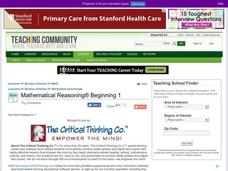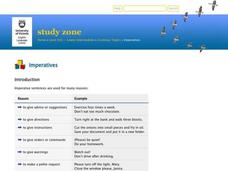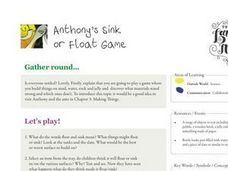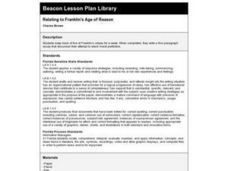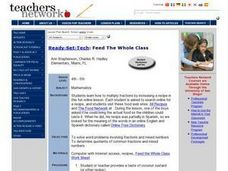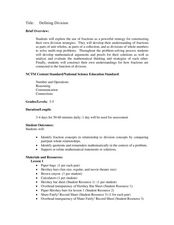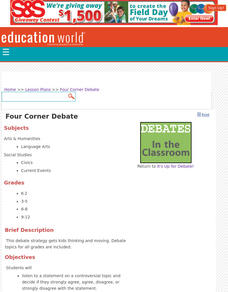Curated OER
Mathematical Reasoning
In this data analysis worksheet, students read a list of 4 criteria and then select the picture on the sheet that matches the criteria.
Curated OER
Reasons for the United States Entry into World War I
For this World War I worksheet, students complete a graphic organizer with details about the U.S. neutrality, German submarine warfare, and the Zimmerman telegram.
Curated OER
ELL Rollover Accident- What Should Bob Do Next?
In this ELL reading and reasoning worksheet, students read a short selection about a man who was in a rollover accident. They answer 5 true or false questions, before writing a short essay detailing whether the man should or should not...
Curated OER
Plant the Beans
In this reasoning worksheet, students draw pictures of beans in empty jigsaw puzzles. Students use the number of beans specified; every part must have at least one bean and parts that touch can't have the same number of beans. There are...
Curated OER
Summer Machines Activity: Cool Tools
Students examine and think about various tools in their surrounding environment to facilitate development of their primary observation and sorting skills. In this tool observation instructional activity, students first sort a variety of...
Curated OER
Imperatives
In this imperatives activity, students read 7 reasons and examples of imperatives. Students then click on "continue with the exercises at the bottom" to choose the best imperative for 8 sentences.
Curated OER
Anthony's sink or float game
Students explore the concepts of float and sink by playing a game where they build things on mud, water, rock and jelly. In this Anthony's sink or float game lesson, students discover what materials remain strong in various conditions....
Curated OER
Math: Reasoning and Problem Solving using Voyages
Students plan a voyage as the captain of a tall ship in the early days of exploration and merchant trading. They choose 2 ships and 3 voyages for a total of 6 possibilities. They calculate the number of days and distance of their...
Curated OER
Numbers Beyond Reason!
Fourth graders use the story of the discovery of irrational numbers to explore the different classes of numbers, the different ways in which numbers may be represented, and how to classify different numbers into their particular class.
Curated OER
Relating to Franklin's Age of Reason
Fourth graders read a selection describing 13 virtues from "The Autobiography of Benjamin Franklin." They keep track of their behavior and whether or not they can keep up with 5 chosen virtues. They write a 5 paragraph essay on their...
Curated OER
Math in Science-Sound Reasoning
In this basic math skills worksheet, students use division, decimals and multiplication to calculate the speed of sound in water and compare it to the speed in air. They calculate distances sound travels in water and the time it takes...
CCSS Math Activities
Smarter Balanced Sample Items: 6th Grade Math – Claim 3
Communication is key. Eight sample items show how important communication and reasoning is for sixth grade mathematics. Part of the Claim 2-4 slide show series, the presentation uses concepts from fifth and sixth grade to illicit...
Curated OER
Propaganda
How does word choice affect the reading of a text? Compare two headlines that were written about the same event. Is one biased? Discuss how word choice often reveals the author's feelings about a topic. Then look at different techniques...
Curated OER
Feed The Whole Class
Students solve word problems and determine quotients of fractions and mixed numbers. They practice multiplying fractions by increasing a recipe found on a food website. In addition, they increase the numbers to feed the whole class a...
Curated OER
I Have a Magic Pot
Pupils will explore numbers rules. They will create a picture of their rule and exchange their paper with a classmate. The classmate works to figure out the rule. They then share with each other how they found the rule. Questions are...
Curated OER
How to Write a Bibliography
Have your class learn to write a bibliography. First they are introduced to bibliographies and their purpose. Then, they examine what information must be included in their bibliography. In the end, they write a bibliography of their own.
Curated OER
Defining Division
Upper graders explore division through fair-shares. They will review fair shares and fractions as a segway into division. They start by playing "Share Fairly" game and create mathematical arguments for solving problems. Manipulatives and...
Curated OER
Covalent Bonding
Using chlorine as the model to demonstrate the structures and representations, this PowerPoint clearly labels and details the main atomic structures and reasons for bonding. The electrons in the outer shell are diagramed and then the...
Curated OER
College is Power
Why go to college if you'll make the same working at the grocery store? Inform your learners on all the reasons why having a college degree is a prerequisite for personal success. Listed here are famous college graduates, various reasons...
Kenan Fellows
Let's Move
Find a statistical reason for a fresh start. Using a hypothetical scenario, individuals research statistical data of three different cities. Their goal? Find the best statistical reason for a business to move to a new location. Their...
Howard Hughes Medical Institute
Genetic Switches
Is it reasonable for us to alter genes in plants to make them more nutritious and better tasting? Is it reasonable for us to alter genes to make babies smarter or better looking? The human genome contains millions of gene switches for...
CCSS Math Activities
Smarter Balanced Sample Items: High School Math – Claim 3
Communication is the key. A presentation provides 25 sample items for Claim 3, Communicating Reasoning, for the Smarter Balanced High School Math assessment. Items require pupils to answer the question and provide logical reasoning to...
Curated OER
Four Corners Debate
Should the student population wear uniforms to school? Pupils express whether they strongly agree, agree, disagree, or strongly disagree with a controversial statement, moving to a designated corner of the room to indicate their stance....
National Endowment for the Humanities
Lesson 4 James Madison: Internal Improvements Balancing Act—Federal/State and Executive/Legislative
Who has the power? The founding fathers asked the same question when the United States was formed. Learners explore issues that arose during Madison’s presidency that raised constitutional questions. Through discovery, discussion, and...
Other popular searches
- Deductive Reasoning Puzzles
- Deductive Reasoning
- Inductive Reasoning
- Logical Reasoning
- Proportional Reasoning
- Reason for the Seasons
- Mathematical Reasoning
- Deductive Reasoning Math
- Thinking and Reasoning
- Thinking & Reasoning
- Inferential Reasoning
- Proportional Relationships


